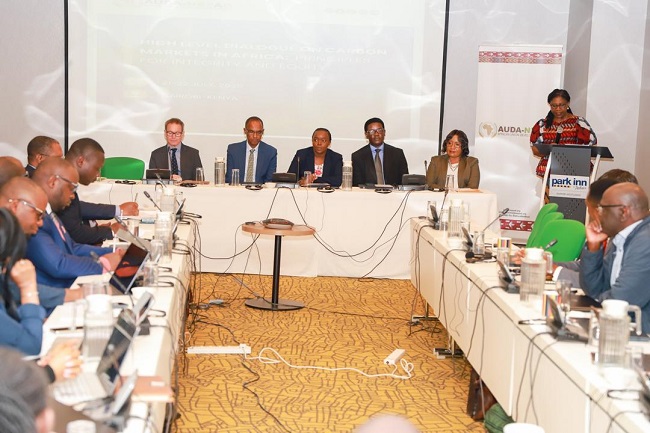The African Union Development Agency (AUDA-NEPAD) on Thursday, July 31, 2025, announced a series of bold initiatives to elevate Africa’s role in global carbon markets and ensure they deliver both climate and development benefits for the continent.
The announcements were made at a high-level continental dialogue convened in collaboration with the Government of Kenya and Afreximbank.

The consultation opened with statements from Dr. Deborah Mlongo Barasa, Cabinet Secretary for Environment, Republic of Kenya; Ambassador Ali Mohamed, Kenya’s Special Climate Envoy; Neil Wigan OBE, British High Commissioner to Kenya; and Estherine Fotabong, Director of Programme Innovation and Planning at AUDA-NEPAD – reflecting strong political and institutional commitment to Africa’s emerging leadership in carbon markets.
The United Kingdom is supporting these efforts as a key technical partner to AUDA-NEPAD, including through the secondment of UK climate expert Ravi Raichoora to the agency.
Throughout the consultation, AUDA-NEPAD engaged directly with senior representatives from African Union member states, including Madagascar, Kenya, Nigeria, Ethiopia, Ghana, Liberia, and the DRC, who shared their experiences, challenges, and aspirations in navigating carbon markets.
Member States emphasised the vital role AUDA-NEPAD can play – leveraging its continental mandate to promote greater cohesion, alignment, and technical support across the region. In parallel, perspectives from global standard-setters such as the VCMI and ICVCM, rating agencies like BeZero, and leading project developers offered valuable insights into how African priorities can be better reflected in global frameworks.
At the event, AUDA-NEPAD unveiled three major outcomes designed to advance Africa’s carbon market ambitions:
1. The African Integrity & Equity Principles for Carbon Markets – a pioneering framework articulating Africa’s vision for high-integrity, socially inclusive carbon markets. These principles, which will be shaped through broad stakeholder engagement, place social value at the core of market participation. A draft will be presented for formal consultation at the Africa Climate Summit 2 in Addis Ababa (September 9 to 12).
2. A Continental Coordinating Mechanism – comprising technical experts and focal points from across the 55 AU Member States and regional carbon market alliances. This mechanism will reduce fragmentation, promote shared priorities, and strengthen Africa’s collective voice in global carbon market negotiations, thereby fostering a more coherent, transparent, and investable environment.
3. A Digital Tracking Platform for Article 6 Readiness – currently under development, this tool will offer real-time insights into country-level progress. It will enable governments, the private sector, and development partners to identify opportunities, monitor implementation, and direct capacity-building support where most needed. In addition, the platform will support the development of a continent-wide glossary of carbon market terminology, enhancing consistency and alignment with international best practices.
The event also featured strong engagement from the private sector, including project developers, advisory firms, and rating agencies. Private actors and Member State representatives alike welcomed these three key outcomes as critical enablers to unlock Africa’s carbon potential.
Tijani Nwadei, Partner and Co-founder of Visuias Limited, a carbon markets advisory firm, underlined the importance of AUDA-NEPAD’s coordinating role in catalysing participation, enabling benefit-sharing, and supporting the actualisation of a market that places Africa at the forefront of global supply.
Andrew Ocama, Coordinator for the Eastern Africa Alliance on Carbon Markets and Climate Finance, welcomed AUDA-NEPAD taking on a leading coordination role for carbon markets across the continent, emphasising that such leadership is essential to prevent fragmentation and ensure coherent regional implementation.
El-hadj Mbaye, Africa’s lead negotiator for Article 6, called on Member States to take an active role in understanding and engaging in carbon markets, stressing that Africa must shape the future of carbon finance – not simply participate in it.
